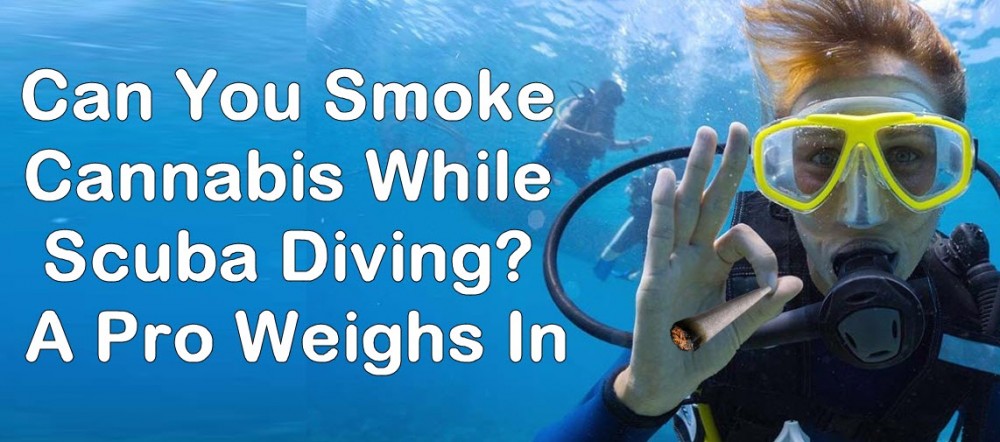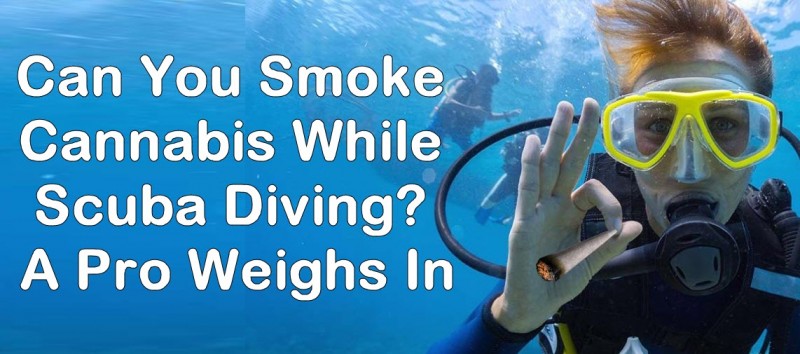Can You Smoke Cannabis While Scuba Diving? A Pro Weighs In

Cannabis is the most commonly used drug in the world. We all know how euphoric it can make us feel, and that’s one of the many reasons why we love it so much.
People from all walks of life enjoy cannabis, and that includes scuba divers. When you scuba dive as a hobby, the idea of combining pot and the marine life underwater surely sounds like a blissful recreational activity.
While we know that there are no side effects to using cannabis, if you’re like many people who enjoy scuba diving, you should probably know that this is one recreational activity that you can’t mix with cannabis use simultaneously.
Though there are no guidelines or research that currently explains why the two don’t mix, let’s take it from a pot-loving scuba dive instructor. Let’s call her Lisa.
In this article, Lisa explains the risks involved between scuba diving and smoking pot. As a professional diver, she warns that there are serious risks involved when you mix the two, but of course maintains that all is fine if you enjoy toking up when you aren’t in the water.
Diving risks
Most people know there are risks associated with scuba diving. If you are a certified diver you would be familiar with the standard diving medical questionnaires to check you are healthy and fit enough to dive, along with liability and risk awareness waivers highlighting the potential dangers of diving - for these reason special dive insurance is usually recommended.
Lets have a look at some of these potential risks and see how cannabis may affect them with the advice of medical professionals.
Nitrogen narcosis
Nitrogen narcosis is a reversible change in consciousness that can occur diving at deep depths (normally deeper than 30 meters). Certain gasses at high pressure can cause an anesthetic effect that alters a diver’s consciousness and divers may experience poor judgment, panic, anxiety, difficulty concentrating, hallucinations or feelings of elation and euphoria similar to being drunk. Narcosis increases the risk of divers forgetting to check their air supply, descending too deep or leaving their dive buddies.
The risk for nitrogen narcosis can be further heightened when you smoke pot.
Lung injuries
The diving environment provides a challenge to the lungs, including exposure to high ambient pressure and altered gas characteristics. Serious medical conditions can occur as the result of lung over-expansion injuries.
The acute effects of smoking marijuana on a diver's lungs increases the risk of mucus plugs, air trapping and gas embolism during a dive. You should be particularly cautious if you have sensitive lungs. When you aren’t diving but still want to smoke pot, look into other forms of consumption such as tinctures or edibles.
Buddy responsibilities
Most scuba diving cultures follow the dive buddy system, where two divers stick together and look out for each other during there dive. Not only can this be more fun, but dive buddies are also important for safety reasons. If you get lost, injured, anxious or have a diving accident, your dive buddy should be the first on the front-line to help. In the case of a diver whose faculties are altered because of diving while high, they are putting their buddy as well as their own safety as risk. This should also be considered if you want to smoke before diving.
Insurance matters
Throughout all the different scuba diving agencies, their education materials and liability waivers all say that the use of drugs is to be avoided during diving, whether its legal or not. With that in mind, divers need to consider how their medical insurance might respond if marijuana is thought to have played a role in the cause of a diving accident. If hospitalization or decompression chamber costs are refused they will likely be facing a hefty bill.
Post dives
Very little research has been carried out on the effects of smoking marijuana before diving to make any definite statements regarding safety. However the general view in the diving industry is to avoid any form of substance that may affect judgment, reflexes or behavior, even if its a prescribed medicine.
After a good day of diving, whilst sharing stories with your fellow dive buddies about all the amazing marine life you have seen, would be the best time to light up and celebrate the ocean if you want to be safe.






